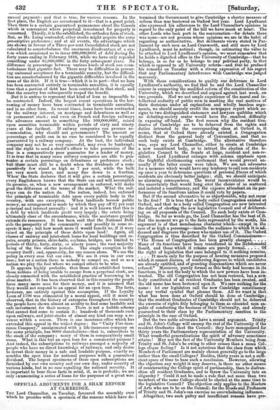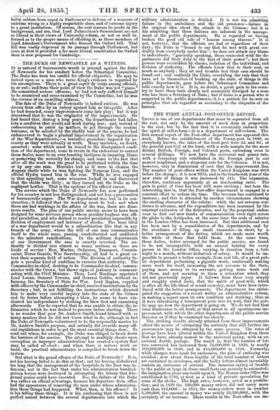With these considerations to qualify our deference to Lord Lyndhurst's
authority, we find that he and the Lord Chancellor . concur in supporting the modifiedreform of the constitution of the University, which we described and argued against last week, on two grounds. Had we not ample experience of the moral and in- tellectual audacity of public men in masking the real motives of their decisions under ad captaradurn and wholly baseless argu- ments, we should scarcely credit the newspaper report which as- signs to two distinguished statesmen and lawyma quibbles which no debating-society orator would have the ,eniailest difficulty in. exposing off-hand. The first reason why the resident Gra- duates of Cambridge are to be debarred from the rights and duties intrusted to the corresponding class at Oxford is, it seems, that at Oxford there already existed a Congregation distinct from the general body of Convocation, and that no such body exists at Cambridge. The alternative therefore was, says my Lord Chancellor, either to create at Cambridge a new constituent body, or to intrust the election of the le- gislative Council to the Senate at large, resident and non-re- sident. Lord Lyndhurst enlarges with ,solemn emphasis upon the frightful electioneering excitement that would prevail an- nually if the latter course were taken. We are not advocates for a measure which would have any tendency to call non-residents up once it year to determine questions of personal fitness of which residents are obviously better judges : still, we should anticipate no alarming consequences. The worst inconvenience would be the Uncertainty that would hang over the choice of so scattered and isolated a constituency, and the expense attendant on its per- formance of its functions unless it could vote by papers.
But if the second alternative be so objectionable, why not recur to the first ? It is true that a body called Congregation existed at Oxford, and that to a body called Congregation are now intrusted the duties of electing the new legislative Council and of deliberat- ing on all proposals of the Council No such body exists at Cam- bridge. So far as words go, the Lord Chancellor has the best of it. But the moment we go to the facts represented by the words, his argument is of that mendacious character which—except in the case of so high a personage—insults the audience to which it is ad- dressed and disgraces the person who makes use of it. The Oxford Congregation is thus described by the Oxford Commissioners- " The House of Congregation has been greatly changed Many of its functions have been transferred to the Hebdomadal
Board, and those which it retains are purely formal ' Of the right of legislation that once belonged to it nothing remains. . . . . It meets only for the purpose of !nearing measures proposed which it cannot discuss, of conferring degrees to which candidates are already entitled, and of granting dispensations which are never refused." Moreover, purely formal as this body had become in its functions, it is not the body to which the new powers have been in- trusted. The old Congregation has not been restored, but a new body oonstituted of all resident Graduates has been created, and. the old name has been bestowed upon it. We care nothing for the name : let our legislators call the new Cambridge constituency by any verbal symbol that pleases them. AU we went is that , what has been done at Oxford should be done at Cambridge; that the resident Graduates of Cambridge should not be debarred the exercise of rights fitly belonging to them as educated men ca- pable of conducting the business of their University, and already guaranteed to their class by the Parliamentary sanction to the principle in the case of Oxford. But the two noble advocates have a second argument. Trinity and St. John's College will swamp the rest of the University if the resident Graduates elect the Council: they have monopolized for thirty years the Parliamentary representation of the University. What wonderful generalizations the spirit of advocacy sometimes attains! May not the fact of the University Members being from. Trinity and St. John's be owing to other causes than a mean Ceole lege clique feeling? Is it not notorious that the class from which Members of Parliament are mainly chosen generally go to the large rather than the small Colleges? Besides, thirty years is not a suffi-. - dent space of time to base such a conclusion. However, allowing the objection any weight it may deserve, is there no other means of counteracting the College spirit of partisanship, than to disfran- chise all resident Graduates, and to throw the University jute an oligarchy ? Could it not be made a rule that not more than two members of the same College should be elected at the same time to the legislative Council ? The objection only applies to the Masters of Arts who are to be on the Council; for the Heads aid Professors of Trinity and St. John's can exercise no overwhelming influence. Altogether, two suoh paltry and insufficient reasons have pro- termined the Government to give Cambridge a shorter measure of Ireform than-was bestowed on Oxford last year. Lord Lyndhurst also expressed his adherence to the Lord Chancellor's opinions in regard to the only point of the bill we have much at heart. The other lords who took part in the conversation—for debate there was none—are not persons whose opinions we are in the habit of regarding as authoritative. But deliberate views stated ist Par- liament by such men as Lord Cranworth, and still more by Lord Lyndhurst, must be noticed; though, in estimating the value to be attached to Lord Lyndhurst's opinion, we must remember that he holds a dignified office in the University of Cambridge—that he belongs, in so far as he belongs to any political party, to that which is opposed to all University reform—and that he prefaced his remarks on Tuesday .with a strong expression of his regret that any Parliamentary interference with Cambridge was judged necessary. bably seldom been urged in Parliament in defence of a measure of extreme wrong to a highly respectable class, and of extreme injury to a great institution. Of coarse, the real reasons lie perdu in the background, and are, that Lord Palmerston's Government are not so liberal in their views of University reform, or not so well in- formed as to the proper means of effecting it, as those members of Lord Aberdeen's Government who framed the Oxford bill. That bill was vastly improved in its passage through Parliament, but even at first it provided a far more liberal constitution for Oxford than is now proposed for Cambridge.



























 Previous page
Previous page